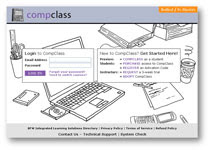Session Description: Teaching with computer games is fast becoming all the rage with the likes of Greg Ulmer, Jim Gee, Cyndi Selfe, and several others who are either teaching with computer games or talking about it. But the central question concerning this symposium workshop is: how feasible is it, really, to teach with computer games? The workshop leaders will present the five most common challenges of teaching with computer games and facilitate informed discussion from the workshop participants for overcoming or addressing those challenges.
These challenges are:
- Administrative: WPAs have concerns about setup costs and assessment.
- Technical: Game platforms can be expensive, insecure, and become obsolete.
- Pedagogical: How does one authoritatively map skill transfer from game settings to real world applications?
- Content-Centered: Navigating the cultural, ethical, and moral values embedded in games is difficult.
- Production/Adoption-Oriented: There are thousands of games and dozens of game development tools—which ones are right for your curricula?




4 comments:
Here's a link to a Kairos coverweb where Leslie Harris describes teaching Dante's Inferno in a MOO:
http://english.ttu.edu/kairos/1.2/coverweb/classes.html
here is a list of resources on computer games, education, rhetoric, and composition that ken and i referred to in our workshop:
Colby, R. and Shultz Colby, R. (2008). “A Pedagogy of Play: Integrating Computer Games into the Writing Classroom.” Computers and Composition, 25(3): 300-12.
Colby, R. and Shultz Colby, R. (2008). “Computer Games and the Writing Classroom: Four Perspectives.” Computers and Composition Online. Retrieved 12 September 2008 from http://www.bgsu.edu/cconline/gaming_issue_2008/Colby_Colby_design/.
Gee, James Paul. What Video Games have to Teach us about Learning and Literacy. Palgrave. 2003.
Huizinga, Johan. Homo Ludens: A Study of the Play-Element in Culture. Beacon. 1971.
Johnson, Steven. Everything Bad is Good for You. Riverhead Trade. 2005.
King, M. (2008). “Remapping Rhetorical Peaks: A Video Game for First-year Writing.” Computers and Composition Online. Retrieved 12 September 2008 from http://www.bgsu.edu/cconline/gaming_issue_2008/King_Rhetorical_peaks/.
Koster, Raph. A Theory of Fun for Game Design [ILLUSTRATED]. Paraglyph. 2004.
McAllister, Ken S. Game Work: Language, Power, and Computer Game Culture. University of Alabama Press. 2004.
Moberly, K. (2008). “Composition, Computer Games, and the Absence of Writing.” Computers and Composition, 25(3): 284-99.
Moeller, R.M. and White, K. (2008). “Enter the Game Factor: Putting Theory into Practice in the Design of Peer Factor.” Computers and Composition Online. Retrieved 12 September 2008 from http://www.bgsu.edu/cconline/gaming_issue_2008/Moeller_White_Enter_the_game/.
Prensky, Mark. Digital Game-Based Learning. McGraw-Hill. 2001.
Salen, Katie and Eric Zimmerman. Rules of Play. MIT. 2003.
Selfe, Cynthia and Gail Hawisher. Literate Lives in the Information Age. Routledge. 2004.
also referenced in our workshop was an archive of "serious" games--games with political, social, and corporate agendas. Good for seeing how to put together simple but effective teaching games. see watercooler games.
Post a Comment